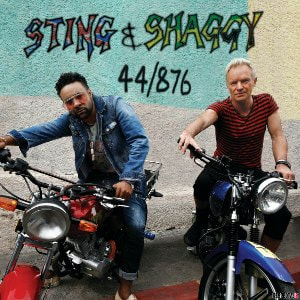|
CRR archive album review by Eric Sandberg — Sting & Shaggy - 44/876 Rating: C
One of the more prescient moments in the mockumentary, "This Is Spinal Tap" occurs during the tour wrap party on an LA rooftop where David St. Hubbins and Derek Smalls are discussing what they are going to do with all of their free time. There is talk of recording a collection ballads with the London Philharmonic and reviving that set aside musical adaptation of the life of Jack The Ripper ("You're a naughty one, Saucy Jack"). Are these ideas any more ridiculous than say, recording an album full of 16th century lute music? Is it any more un-self-aware than Elvis Costello, with a voice suited only for angry punk-pop, making an album with an opera singer or a master of pop standards? One could argue that Gordon Matthew Thomas Sumner (who still says, "Call me Sting", even though he is 66), following up from his mostly flat return to Rock (57th & 9th, 2016), is making a pilgrimage to his roots in making a reggae album. One could also argue that the the Police only appropriated the rhythms and vocal phrasings of reggae in a punk setting, creating an exciting new genre. The format was completely abandoned by the making of 1983's Synchronicity, making the toleration of Stewart Copeland's snark while laying down his amazing steel rhythms, no longer necessary. Hence, Sting launched a highly successful solo career which essentially ended with the, devoid of a hum-able melody, release, Sacred Love (2003). Since then, fans have been subjected to fifteen years of 'trying things'. In the opening, and title, track, which refers to the telephone country codes of England and Jamaica, Sting explains that the cold politics of his country have driven him to seek warmer climes, and Pop/Reggae maestro, Shaggy, is more than happy to receive him (and the boost his retirement fund will receive from this partnership). The album itself is twelve tracks of pleasant, modern reggae/pop and not much more. This is a CD I will throw on at my next cocktail party and no one will notice it has been playing all night. Sting is not taking any musical risks here but he is taking the bold risk of pitting his thin, reedy voice against Shaggy's commanding baritone and authentic Caribbean inflection. This folly is a lesson Sting has failed to learn from past experience. His attempt to star in a revival of Bertold Brecht's Threepenny Opera in 1989 was savaged by critics (who noted that his voice was "surprisingly thin" compared to his seasoned Broadway cast-mates) closed quickly. If I ask you to conjure up Sting's threesome with Bryan Adams and Rod Stewart on 1993's "All for Love" in your head, is it Sting's voice you hear? Chances are you can only remember Bryan Adam's, and he's no Caruso himself. Sting, like Elvis Costello, has a marvelous voice when it is wielded within the important musical world he created, but when importance becomes self-importance, artists like Sting and Elvis often tread into treacherous landscapes, garbed only in the emperor's new clothes. Oh, and I'll bet you my copy Raising Sand that 44/876 wins a Grammy.
1 Comment
|
CategoriesAuthorsEric Sandberg: My true opinion on everything is that it's splunge. Archives
December 2022
Categories |
Proudly powered by Weebly

 RSS Feed
RSS Feed